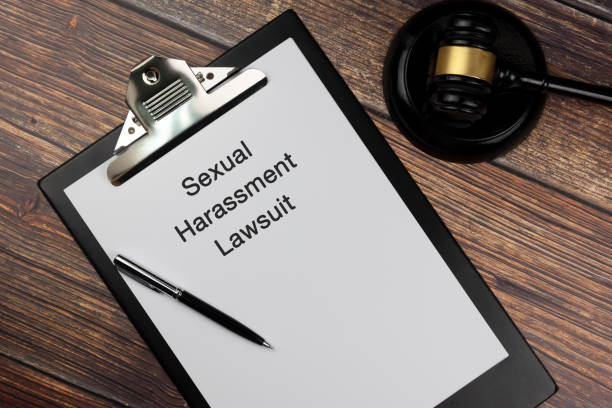Historical Sexual Harassment – Is it too late to speak up? We get allot of calls regarding this topic. It is not uncommon for victims of sexual harassment to delay reporting what happened to them. In the Fourth National Survey on Sexual Harassment in Australian Workplaces, conducted in 2018, it was found that 72% of Australians (85% of women and 57% of men) experienced sexual harassment on at least one occasion in their lifetime.[1]
However, it was also found that 33% of Australians (39% of women and 26% of men) had been sexually harassed in the past five years (2013-2018).[2] Both sets of statistics are staggering. However, it is also clear that there are historic instances of sexual harassment, many of which may not have been reported at the time, especially considering the #MeToo movement only emerged in recent years.

Why might sexual harassment not be reported?
Sexual harassment is a confronting matter, and for a victim, it may result in feelings of confusion, shame, humiliation, or fear. Trauma is a complex psychological state, and reactions can likewise be complex.
Some victims may dissociate or block out memories of the incident, as a coping mechanism. Other studied psychological responses to trauma include the “fight, flight or freeze” reaction. There is also another lesser-known reaction studied called “fawn”, which is where the victim may acquiesce to the perpetrator’s conduct so as to prevent the situation from escalating.
There is no one way to manage trauma from sexual harassment, and therefore, it cannot be expected that all victims will feel comfortable immediately reporting their sexual harassment. Neither should it be the case that victims who do not escape the situation, but rather “freeze” or “fawn”, should be made to feel culpable.
Victims may also confront feelings that they may not be believed, and rather be accused of lying and exaggerating. Another complexity of sexual harassment matters is that typically there are no witnesses, which may lead to a victim feeling as though they have no evidence to make a report. This may lead to a victim being made to feel responsible for what happened to them, or they may question their reality. It may be particularly difficult for a victim to make a report to their employer when the perpetrator is in a senior position or well-liked, as victims may feel that their report will not be taken seriously or could result in them being punished for speaking out.
Why might sexual harassment not be reported?
Sexual harassment is a confronting matter, and for a victim, it may result in feelings of confusion, shame, humiliation, or fear. Trauma is a complex psychological state, and reactions can likewise be complex.
Some victims may dissociate or block out memories of the incident, as a coping mechanism. Other studied psychological responses to trauma include the “fight, flight or freeze” reaction. There is also another lesser-known reaction studied called “fawn”, which is where the victim may acquiesce to the perpetrator’s conduct so as to prevent the situation from escalating.
There is no one way to manage trauma from sexual harassment, and therefore, it cannot be expected that all victims will feel comfortable immediately reporting their sexual harassment. Neither should it be the case that victims who do not escape the situation, but rather “freeze” or “fawn”, should be made to feel culpable.
Victims may also confront feelings that they may not be believed, and rather be accused of lying and exaggerating. Another complexity of sexual harassment matters is that typically there are no witnesses, which may lead to a victim feeling as though they have no evidence to make a report. This may lead to a victim being made to feel responsible for what happened to them, or they may question their reality. It may be particularly difficult for a victim to make a report to their employer when the perpetrator is in a senior position or well-liked, as victims may feel that their report will not be taken seriously or could result in them being punished for speaking out.
Why should sexual harassment be reported?
Sexual harassment is a systemic issue in Australian workplaces, no matter the size, industry or composition of the workplace. Often, it is only through reporting sexual harassment that a company can know about the inappropriate conduct of its employees and take the requisite action to prevent it from occurring further and to mitigate the harm that has already been inflicted.
How long ago is ‘too long’ to report sexual harassment?
State Human Rights Commissions typically impose a time limit of twelve months for sexual harassment and discrimination complaints. For the Australian Human Rights Commission (AHRC), the time limit is six months. The rationale for imposing such a time limit is to ensure that the employer or any individual respondents are not unfairly prejudiced by a significant amount of time lapsing since the incident, during which some employees or witnesses may have left their employment, or records lost.
Nevertheless, matters that are out of time may still be considered by the Commissions at their discretion. Typically, a complainant will be required to explain reasons for the delay. Therefore, even if sexual-harassment or discrimination occurred more than twelve months ago, an individual is still able to make a complaint to a State Human Rights Commission.

Historical Sexual Harassment
Moreover, if the circumstances are appropriate, you can also consider making a sexual harassment complaint to your employer, if you believe there is anything the employer could reasonably do to mitigate further harm. For example, if you were sexually harassed five years ago, but your perpetrator still works for the company or closely alongside you, then it may be reasonable for you to report the historic sexual-harassment to the company to have the perpetrator moved to another department or subjected to disciplinary action.
It is important to remember that when the employer does not know about sexual-harassment, there is nothing they can do to help you. Therefore, it can still be fruitful to make a report of historic sexual-harassment if you are still suffering and there is a tangible outcome your employer could provide.
Conversely, if your employer did know about the sexual harassment but failed to take action at the time, or currently, it may still be worthwhile making a historic sexual harassment complaint to a State Human Rights Commission or the AHRC to finally achieve a fair outcome. It should be noted that if you still work for the company, it may be easier to achieve an outcome than if you have left the company a long time ago.

Historical Sexual Harassment – Is it too late to speak up?
Whether or not to make a historic workplace sexual harassment complaint inherently depends on the circumstances, particularly how long ago it occurred, whether you are still employed by the same company and the gravity of the harassment. To further discuss whether you could make a complaint of historic sexual -arassment, call 1800 333 666 for an obligation-free consultation. We are A Whole New Approach P/L, we are the nations leading workplace advisors (we are not lawyers), have a concern, a question, feel confident you can call us and discuss it, we are not he-re to judge, we are here to help.
[1] Australian Human Rights Commission, Everyone’s Business: Fourth National Survey on Sexual-Harassment in Australian Workplaces (Report, 2018) 18 (‘Fourth National Survey’); Australian Human Rights Commission, Respect@Work: National Inquiry into Sexual-Harassment in Australian Workplaces (Report, 2020) 85 (‘Respect@Work Report’).
[2] Fourth National Survey (n 1) 8; Respect@Work Report (n 1) 17.













